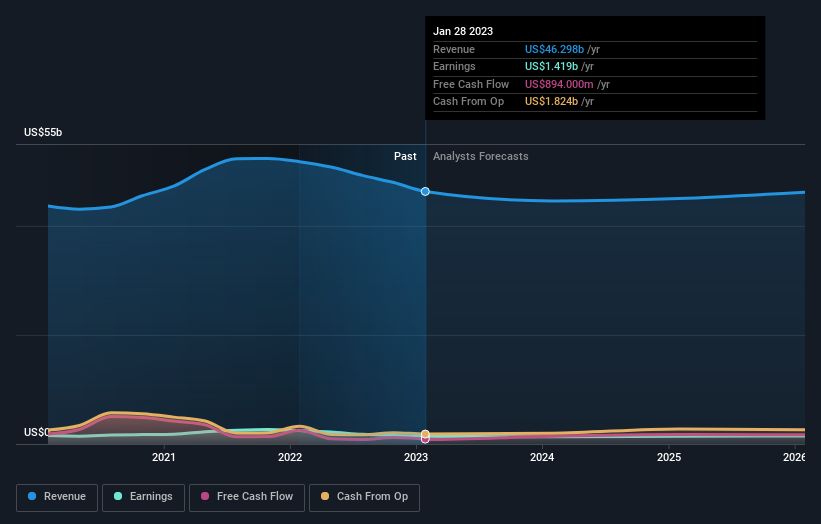
Best Buy Co., Inc. (NYSE:BBY) received a lot of attention from a substantial price movement on the NYSE over the last few months, increasing to US$88.95 at one point, and dropping to the lows of US$69.49. Some share price movements can give investors a better opportunity to enter into the stock, and potentially buy at a lower price. A question to answer is whether Best Buy's current trading price of US$69.49 reflective of the actual value of the large-cap? Or is it currently undervalued, providing us with the opportunity to buy? Let’s take a look at Best Buy’s outlook and value based on the most recent financial data to see if there are any catalysts for a price change.
Check out our latest analysis for Best Buy
Is Best Buy Still Cheap?
Good news, investors! Best Buy is still a bargain right now. According to my valuation, the intrinsic value for the stock is $105.98, which is above what the market is valuing the company at the moment. This indicates a potential opportunity to buy low. However, given that Best Buy’s share is fairly volatile (i.e. its price movements are magnified relative to the rest of the market) this could mean the price can sink lower, giving us another chance to buy in the future. This is based on its high beta, which is a good indicator for share price volatility.
What kind of growth will Best Buy generate?

Future outlook is an important aspect when you’re looking at buying a stock, especially if you are an investor looking for growth in your portfolio. Although value investors would argue that it’s the intrinsic value relative to the price that matter the most, a more compelling investment thesis would be high growth potential at a cheap price. However, with a relatively muted profit growth of 3.5% expected over the next couple of years, growth doesn’t seem like a key driver for a buy decision for Best Buy, at least in the short term.
What This Means For You
Are you a shareholder? Even though growth is relatively muted, since BBY is currently undervalued, it may be a great time to accumulate more of your holdings in the stock. However, there are also other factors such as capital structure to consider, which could explain the current undervaluation.
Are you a potential investor? If you’ve been keeping an eye on BBY for a while, now might be the time to make a leap. Its future outlook isn’t fully reflected in the current share price yet, which means it’s not too late to buy BBY. But before you make any investment decisions, consider other factors such as the strength of its balance sheet, in order to make a well-informed buy.
Keep in mind, when it comes to analysing a stock it's worth noting the risks involved. To that end, you should learn about the 4 warning signs we've spotted with Best Buy (including 1 which is a bit concerning).
If you are no longer interested in Best Buy, you can use our free platform to see our list of over 50 other stocks with a high growth potential.
If you're looking to trade Best Buy, open an account with the lowest-cost platform trusted by professionals, Interactive Brokers.
With clients in over 200 countries and territories, and access to 160 markets, IBKR lets you trade stocks, options, futures, forex, bonds and funds from a single integrated account.
Enjoy no hidden fees, no account minimums, and FX conversion rates as low as 0.03%, far better than what most brokers offer.
Sponsored ContentValuation is complex, but we're here to simplify it.
Discover if Best Buy might be undervalued or overvalued with our detailed analysis, featuring fair value estimates, potential risks, dividends, insider trades, and its financial condition.
Access Free AnalysisHave feedback on this article? Concerned about the content? Get in touch with us directly. Alternatively, email editorial-team (at) simplywallst.com.
This article by Simply Wall St is general in nature. We provide commentary based on historical data and analyst forecasts only using an unbiased methodology and our articles are not intended to be financial advice. It does not constitute a recommendation to buy or sell any stock, and does not take account of your objectives, or your financial situation. We aim to bring you long-term focused analysis driven by fundamental data. Note that our analysis may not factor in the latest price-sensitive company announcements or qualitative material. Simply Wall St has no position in any stocks mentioned.
About NYSE:BBY
Best Buy
Offers technology products and solutions in the United States, Canada, and internationally.
6 star dividend payer and undervalued.
Similar Companies
Market Insights
Community Narratives



